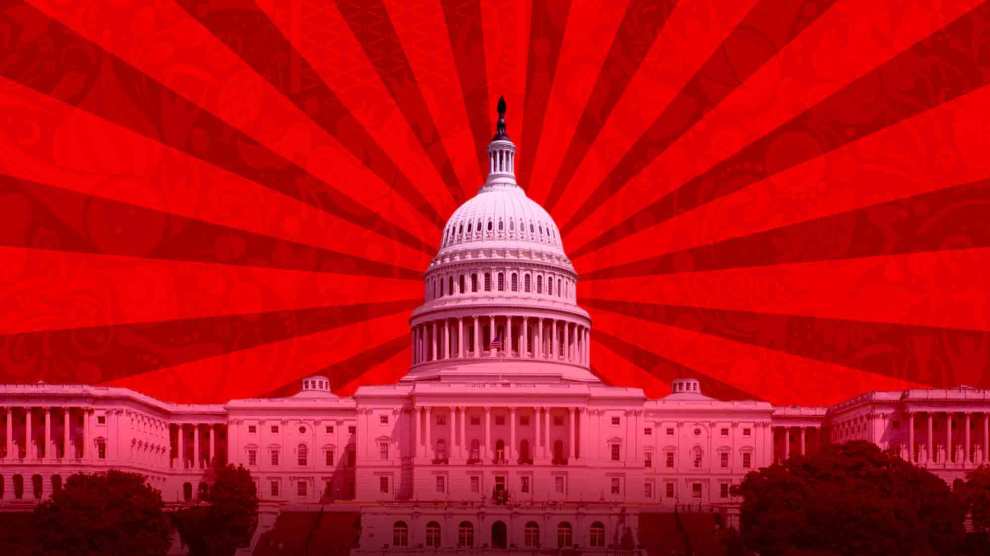
Congress: aoc.gov/Wikimedia Commons; Soviet flare: serkorkin/iStock; Soviet background: badvviser/iStock
Special Counsel Robert Mueller announced on Friday that a grand jury has indicted 13 Russian nationals for tampering with the US political process.
The 37-page indictment details an extensive operation aimed at influencing the 2016 US presidential election. It focuses on the Internet Research Agency, a Kremlin-linked Russian “troll factory” based in St. Petersburg. The IRA, notes the indictment, “had a strategic goal to sow discord in the U.S. political system.” By mid 2016, the IRA’s operations “included supporting the presidential campaign of then Donald J. Trump…and disparaging Hillary Clinton.”
Deputy Attorney General Rod Rosenstein laid out the charges in a press conference at the Justice Department. The Russian defendants, Rosenstein said, “allegedly conducted what they called ‘information warfare’ against the United States, with the stated goal of spreading distrust of candidates and political system in general.” He stressed that “there is no allegation in this indictment that any American was a knowing participant in this activity” or that the Russian effort “altered the outcome of the 2016 election.” He also said that the government has not yet had any communications with the Russians and that the Justice Department “will follow ordinary process of seeking cooperation and extradition.”
The indictment alleges that the Russians specifically sought to boost Trump while hurting his rivals. “By 2016, Defendants and their co-conspirators used their fictitious online personas to interfere with the 2016 U.S. presidential election,” it states. “They engaged in operations primarily intended to communicate derogatory information about Hillary Clinton, to denigrate other candidates such as Ted Cruz and Marco Rubio, and to support Bernie Sanders and then-candidate Donald Trump.” According to the indictment, “specialists”—as the Internet Research Agency’s social media operatives were known—were instructed, according to an internal document, to “use any opportunity to criticize Hillary and the rest (except Sanders and Trump—we support them).”
Rosenstein did not assert that Mueller is not looking into collusion by Americans, but merely that the indictment does not include such charges. But his words are likely to be used by Trump and his backers to argue that there was no collusion.
Rosenstein added, “This indictment serves as a reminder that people are not always who they appear to be on the internet.”
Here’s are a few of the key revelations about the IRA and two companies with various Russian government contracts that funded it, Concord Management and Consulting and Concord Catering, which were also indicted:
- Some of the people indicted communicated with “unwitting individuals associated with the Trump campaign.”
- “Starting in or around June 2016, Defendants and their co-conspirators, posing online as US persons, communicated with a real US person affiliated with a Texas-based grassroots organization.”
- In the weeks before the presidential election, the Russians organized pro-Trump and anti-Hillary Clinton rallies in states including Florida, New York, and Pennsylvania, as well as in the District of Columbia. After the election, they coordinated anti-Trump protests, including a “Trump is NOT my President” protest in New York and a “Charlotte Against Trump” rally in North Carolina.
- One of the defendants emailed a family member in September 2017: “We had a slight crisis here at work: the FBI busted our activity (not a joke). So, I got preoccupied with covering tracks together with the colleagues.”
- By September 2016, the monthly budget for the IRA’s operation was about $1.25 million.
- Concord funded the IRA as part of an interference operation it called “Project Lakhta.”
- To conceal its involvement, Concord labeled its payments to the IRA as being for software support.
- The indictment identities individuals who were at the top of the IRA’s hierarchy. These include the group’s executive director, Mikhail Burchik, and several other high-ranking employees, who traveled to the United States under false pretenses, stopping in Nevada, California, New Mexico, Colorado, Illinois, Michigan, Louisiana, Texas, Georgia, and New York, to collect intelligence for the IRA’s interference operation.
- From April to November 2016, the IRA and several of its indicted employees began to produce and purchase political advertisements that opposed Clinton and advocated electing Trump. They purchased these ads with Russian bank accounts and credit cards registered to fake US names. These ads included taglines like “You know, a great number of black people support us saying that #HillaryClintonIsNotMyPresident” and “Donald wants to defeat terrorism…Hillary wants to sponsor it.”
Prior to Rosenstein’s press conference, the special counsel’s office released the following statement:
A federal grand jury in the District of Columbia returned an indictment on Feb. 16, 2018, against 13 Russian nationals and three Russian entities accused of violating U.S. criminal laws in order to interfere with U.S. elections and political processes. The indictment charges all of the defendants with conspiracy to defraud the United States, three defendants with conspiracy to commit wire fraud and bank fraud, and five defendants with aggravated identity theft.
This is a developing story. Check back for updates.
Read the full indictment:
















